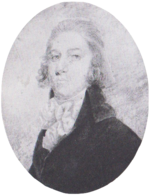Ralph Clark
|
Lieutenant Ralph Clark |
|
|---|---|
 |
|
| Personal details | |
| Born | 30 March 1755 or 1762 Edinburgh, Scotland |
| Died | June 1794 West Indies |
| Military service | |
| Allegiance |
|
| Service/branch | Royal Marines |
| Years of service | 1779–1794 |
| Rank |
Second lieutenant (1779–1792) First lieutenant (1792–1794) |
Lieutenant Ralph Clark (30 March 1755 or 1762 – June 1794) was a British officer in the Royal Marines, best known for his diary spanning the early years of British settlement in Australia, including the voyage of the First Fleet.
Born in Edinburgh, Scotland, Clark saw service in the American Revolutionary War before volunteering for the voyage to Australia. Arriving in New South Wales in January 1788, he filled a number of roles in the newly established colony, including serving on picket duty, guarding convicts, and on the Criminal Court. Having been temporarily promoted to the rank of first lieutenant, Clark was sent to Norfolk Island aboard HMS Sirius in March 1790, which was subsequently wrecked off the island's coast. After a period on the island, he returned to England aboard HMS Gorgon, arriving in June 1792, and was then posted to the West Indies to fight in the French Revolutionary Wars, dying in a battle off the coast of Hispaniola in June 1794. Clark's diaries, although never intended to be published, provide some of the most personal information about the early convict era in Australia, and are currently held by the State Library of New South Wales.
Clark was born in Edinburgh, Scotland, to Ann (née Man) and George Clark. He enlisted as a second lieutenant in the 27th Company of the Royal Marines on 25 August 1779, having previously been in the "Dutch service". Clark saw service in the American Revolutionary War, and at the end of his service returned to live in London, although he was assigned to the Portsmouth division of the marines. Having transferred to the 6th Company in 1783, He married Betsy Alicia Trevan, of Efford, Devon, on 23 June 1784, with a son, Ralph Stuart Clark, born on 23 August 1785. In order to further his chances for promotion (and thus a higher salary), Clark volunteered to serve in the New South Wales Marine Corps, which accompanied the First Fleet, which was transporting convicts to a penal colony that was to be established in New South Wales. He was posted to the Friendship, which held mainly female convicts.
...
Wikipedia
